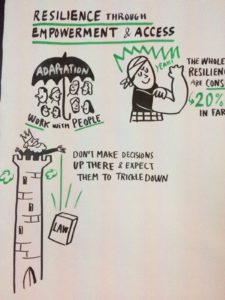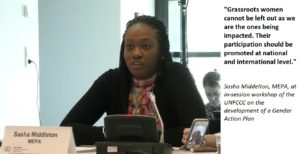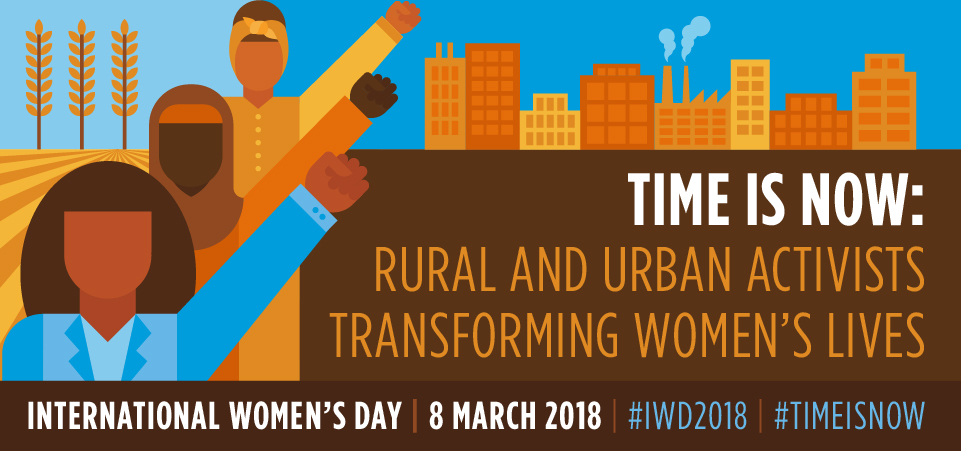International Women’s Day 2018 will put a spotlight on the tireless work of activists who have been central to the unprecedented global efforts for women’s rights, equality and justice worldwide. Under this year’s theme, “Time is Now: Rural and Urban Activists Transforming Women’s Lives”, events around the world will capture the vibrant work of activists and their mobilization for change.
While some of these movements have captured the headlines, other efforts persevere far away from the limelight. Rural and urban activists continue to mobilize, disrupt the status quo, and influence a broad range of policy, legislative and social reforms, from founding projects to end violence at the workplace to providing access to services for ethnic, immigrant and minority women, to building community resilience against the impacts of climate change, they are working every day to leave no one behind.
Rural women and their organizations represent an enormous potential, making up over a quarter of the world population. The theme of the upcoming 62nd session of the Commission on the Status of Women will focus on the challenges and opportunities they face. Rural women till the lands and plant seeds ensuring food security for their communities. As primary energy managers in households, they can lead the way in transitioning to sustainable energy and build climate resilience.
Yet, on almost every measure of development, rural women fare worse than rural men or urban women. They are disproportionately affected by poverty and unequal access to land and natural resources, infrastructure and services, and decent work and social protection and this in turn makes them amongst the most vulnerable people to the impacts of climate change but also critical to building climate resilience.

Graphical representation of the climate justice dialogue hosted by the Foundation at Development and Climate Days 2017. The dialogue focused on enabling the meaningful participation of grassroots women in climate policy decision-making.
As a pre-requisite to building climate resilience is the empowerment of rural women. Enabling the participation of rural women in climate policy decision-making is critical to climate action that is fair and for all. The Foundation believes that the policy arena should actively create opportunities to value local and traditional knowledge and the lived experience of front line communities in policy development. Women’s voices must be heard and their priorities supported as part of climate justice. Rural women are critically aware of the importance of climate justice in contributing to the realisation of the right to development and can play a vital role as agents of change within their communities.
While the importance of women’s participation at multiple levels of decision-making, and of integrating gender into climate actions is well documented, there is a dearth of documented follow-up on the impact of such participation. This is in part due to the fact that women’s participation remains limited in many aspects of life but in addition there is a need to document the impact of women’s meaningful participation on the effectiveness of climate actions. Too often women are categorised as vulnerable with little acknowledgement that they can and already are offering solutions – they offer hope for successful adaptation and low carbon development through their critical knowledge, experience and the unique role that they play in agriculture, food security, livelihoods, income generation and management of our natural resources. Enabling women’s participation is not only the right thing to do, it also is the smart thing to do.
Recommendations to enable women’s meaningful participation in climate policy decision-making;
Increase the participation of women in climate actions at all levels: Involving women in the design, planning and implementation of climate actions has positive benefits for men and women. While the evidence base is low, the case studies presented here showcase the positive benefits for people and planet when women are enabled to participate.
Understand the context in relation to women’s ability to participate: Women’s ability to meaningfully participate in decisions that affect their lives hinges on a multitude of factors: structural inequality, political marginalisation, restrictive cultural norms and informal discriminatory practices.
 Shift the emphasis from women’s representation to meaningful participation in climate actions: There is evidence that the barriers do not disappear once women reach the decision-making table. There is need to avoid just counting numbers of women and ensure the meaningful participation of women in climate actions.
Shift the emphasis from women’s representation to meaningful participation in climate actions: There is evidence that the barriers do not disappear once women reach the decision-making table. There is need to avoid just counting numbers of women and ensure the meaningful participation of women in climate actions.
Invest in training and capacity building to enable meaningful participation: In order to fully realise women’s participation in decision-making processes, women need to be supported with training, networks and access to resources.
Document the good work that is going on to enable women’s participation: This research found that there is limited evidence of the extent of women’s participation in climate action. In order to share lessons learned and establish good practice there is a need to document and share the impact of women’s meaningful participation on the effectiveness of climate actions.
Related Links
Official UN International Women’s Day 2018
Policy Brief – Women’s Participation: An Enabler of Climate Justice


